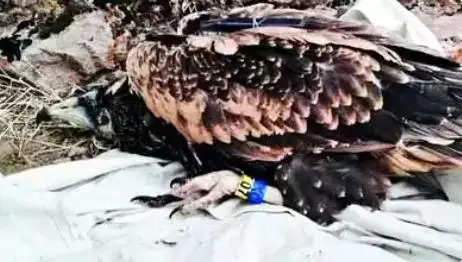GPS-Tagged Egyptian Vultures Found Dead in Rajasthan
Ornithologists tagged these Egyptian Vultures to explore their migratory routes...
Two Egyptian vultures, equipped with rings and GPS tags by the Russian Raptor Research and Conservation Network (RRRCN) in the Karatau mountains of Kazakhstan, were discovered lifeless in Rajasthan. This unfortunate incident highlights the interconnectedness of global efforts to monitor and protect avian species.
The vultures, marked for tracking purposes, serve as ambassadors of conservation, providing valuable data on their migration patterns and behavior. However, their untimely demise in Rajasthan raises concerns about the challenges these migratory birds face, emphasizing the need for collaborative conservation initiatives to safeguard their populations across borders.
In August 2022, a male bird, tagged for monitoring purposes, was tragically found deceased in Jaisalmer. This bird had undertaken an impressive journey, covering a distance of 3,512 km before arriving in the region. The discovery of its lifeless body raises concerns about the challenges and potential threats faced during its migration.
Similarly, a female bird, tagged on July 29, 2022, met a sad fate in Nokha, located in the Bikaner district of Rajasthan. This female bird had flown a considerable distance of 2,322 km before reaching Rajasthan. The fact that it didn't survive its journey underscores the vulnerability of migratory birds to various risks along their migration routes.
Ornithologists tagged these birds to explore the migratory routes of Egyptian vultures bound for Jorbeer in Bikaner, Rajasthan. Jorbeer is renowned for hosting the largest congregation of raptors in India during the winter season. Recent satellite data has provided insights into the journey of these vultures, shedding light on their migration patterns.
"The bird in Nokha is suspected to be dead due to the Diclofenac drug, which is used in veterinary medicine. When we visited the site, the remains were found in a dumping yard. There was no sign of electrocution or the bird falling prey to feral dogs. We also did not find the device at the location, probably it was dismantled by the dogs." - Dau Lal Bohra, a Vulture Conservationist, he was the part of tagging mission in Kazakhstan.
There is suspicion that the male bird in Jaisalmer has also met its demise, indicated by its recorded location in the heart of the desert for the past few months.
Initially, researchers thought the Egyptian vultures discovered in India and Rajasthan were mostly permanent residents. However, recent studies have overturned this belief, uncovering that these raptors embark on extensive migrations from the Karatau Mountains in Kazakhstan. This mountainous region is touted as the largest vulture colony globally, emphasizing the surprising migratory nature of these birds.
Environmentalists say that over 17 types of raptors, totaling in the thousands, migrate to the carcass dumping site in Rajasthan. This location boasts the highest number of raptors in both the country and Asia.
Source: Times Of India
To join us on Facebook Click Here and Subscribe to UdaipurTimes Broadcast channels on GoogleNews | Telegram | Signal



